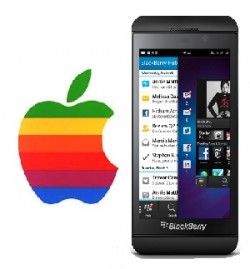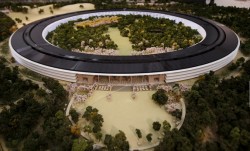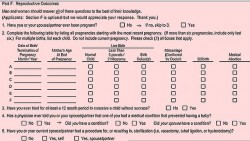 Maybe not so much for apples and oranges, but BlackBerrys and Apples do indeed mix.
Maybe not so much for apples and oranges, but BlackBerrys and Apples do indeed mix.
Within days of last month’s announcement of 4,500 upcoming layoffs by the sinking ship that was once BlackBerry, Apple threw a “career event” in a hotel a few minutes from the firm’s Canadian headquarters.
Sifting through the LinkedIn profiles of the mobile device maker’s engineering and operations professionals, Apple sent out personal invitations. The pitch:
If you are interested in working on the world’s most advanced mobile devices and operating systems as well as alongside other amazing, talented and passionate engineers then Apple may have opportunities for you.
 Now don’t you go calling this poaching. Apple doesn’t like poaching. But the government makes ’em do it.
Now don’t you go calling this poaching. Apple doesn’t like poaching. But the government makes ’em do it.
No word about how many Berryites will go Apple, but it’s gotta be appealing. Besides being wildly successful, Apple is in Cupertino (average winter day temp: around 60 degrees) and BlackBerry is in Waterloo (average winter day temp: around 30 degrees). Plus Apple is getting this cool, new space ship headquarters that got approved just a couple days ago.
Think BlackBerry Has Problems?
Chevron recruiter to applicant: “Thank you so much Ms. Smith for coming in today. Before I can officially extend an offer, I have a few more questions. This will only take a moment. Ready?”
Candidate: “Yes. Go ahead.”
Recruiter: “Have you ever had an abortion? And how many miscarriages and stillbirths?”
Paging Gloria Allred. Gloria Allred you’re wanted in courtroom 1.”
 Chevron’s invasive medical questions, part of its Australian recruitment process, has created a major public stir after the media there got hold of the company’s application. Among the many questions on the form are several about pregnancies, menstrual cycles, “lumps or pain in breasts,” and sexually transmitted diseases.
Chevron’s invasive medical questions, part of its Australian recruitment process, has created a major public stir after the media there got hold of the company’s application. Among the many questions on the form are several about pregnancies, menstrual cycles, “lumps or pain in breasts,” and sexually transmitted diseases.
Some of these questions appear in Section F, which is voluntary. Others are scattered elsewhere, in parts that are required.
Chevron says the medical documents were “guided by industry standards to ensure staff are safe and fit to work,” and were lawful.
Australian lawyers are less sure of that. “It has to be asked, is the information that is being asked reasonable to the employee carrying out their job?” one employment lawyer wondered.
On the other side of the world in New York, Chevron is suing a band of Ecuadorian rainforest inhabitants and their lawyers who won a $19 billion judgment against it. Chevron inherited the lawsuit went it acquired Texaco, but after losing — fraudulently it claims with considerable justification — it’s now suing in American courts to not have to pay damages, for, among other health and environmental issues, reproductive damage done by oil dumping.